Whether investors have reached retirement age or are getting closer, many in this situation have a desire to create an income-generating portfolio. The question is what to include? Do you find dividend stocks to buy, bonds, ETFs, alternative investments, and/or closed-end funds?
There’s no right answer because every person’s situation is different.
“Boomers do not decumulate rapidly in old age due to uncertainty surrounding their life expectancy, a desire to leave a bequest, and access to many investment strategies that allow retirees to generate regular income without selling down their portfolios,” stated Prudential Global Investment Management’s 2016 report on aging.
My father held stocks well into his 80s despite the need to generate income because he wanted to make sure his assets lasted throughout retirement. For him, it was easier to generate income by trimming profits, etc.
Not everyone feels this way. Some want to know that even when they’re holding stocks, they’re still generating income via dividends.
If you’re in this camp, this ladder of dividend-paying stocks to buy should give you a head start for building your income-generating portfolio.
Brookfield Asset Management (BAM)
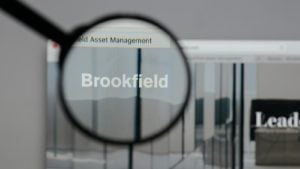
Dividend Yield: 1%
One of the brightest CEOs in North America is Brookfield Asset Management’s (NYSE:BAM) Bruce Flatt. He has run the alternative asset manager for 18 years, building it into a massive company with more than $500 billion in assets under management that cover important and growing asset classes that include real estate, renewable energy, private equity, and infrastructure.
Recently, he’s become less confident about the economy and is preparing the business for an eventual recession.
“We are close to 11 years in this economic cycle. I don’t think economic cycles have been repealed,” Bruce Flatt told BNN Bloomberg’s Amanda Lang in November. “There will be disruption in credit markets, in stock markets. Our view is when you’re in an environment that is more robust than what you might otherwise have in an average environment, you should just be careful. So we have more dry powder in funds, more cash on our balance sheets.”
Investing its own capital side-by-side third-party capital, Brookfield continues to go where others won’t, generating outsized profits for themselves and their clients. It’s a winning formula.
VF Corp. (VFC)
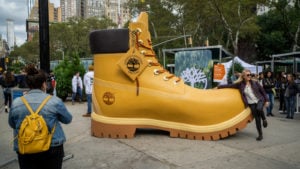
Dividend Yield: 2.3%
VF (NYSE:VFC) is best known for three brands: The North Face, Timberland, and Vans. In the last couple of years, Vans has been the real growth engine with the other two also providing strong support.
Although it continues to narrow the company’s focus by spinning off its slower growth denim brands Lee and Wrangler into a separate company in May 2019, it continues to prune back the number of brands it owns.
On Jan. 23, VF reported its third-quarter results that included $1.23 in adjusted earnings per share and $3.38 billion in sales. Unfortunately, investors were expecting revenue of $3.43 billion.
Worse still, its sales guidance for the fourth quarter was lowered from $11.8 billion to $11.75 billion. While only a difference of $50 million, the revision came on a terrible day for the markets, knocking VFC stock down by more than 10% in midday trading.
In Q3 2019, Vans saw revenues grow 13% during the quarter excluding currency. That compares to an 8% gain for The North Face and a 4% decline for Timberland.
Long-term, the company’s goal to make VF a more “consumer-minded and retail-centric enterprise, with a portfolio of growth-oriented active, outdoor and work brands,” remains intact.
Corrections such as the latest one provide investors with an opportunity to secure a better entry point. Don’t be afraid to take advantage of this unusual slip by a very sound management team.
U.S. Bancorp (USB)
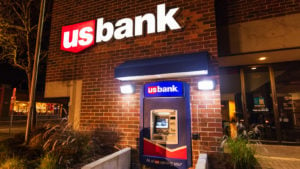
Dividend Yield: 3%
Warren Buffett likes bank stocks. Of Berkshire Hathaway’s (NYSE:BRK.A, NYSE:BRK.B) top 10 equity holdings, four are bank stocks; six, if you include American Express (NYSE:AXP) and Goldman Sachs (NYSE:GS).
Minneapolis-based U.S. Bancorp (NYSE:USB) is Buffett’s 8th-largest holding with a market value of $7.2 billion.
The bank, which has $495 billion in total assets, reported a very soft fourth quarter on Jan. 15. While net interest income fell 2.9% year-over-year to $3.21 billion, its non-interest expenses fell 3.7%. Add in slightly higher provisions for credit losses and you get pre-tax income 14.2% lower than a year earlier.
Its net interest margin, which is the difference between interest income and interest expenses divided by its average earning assets, fell by 23 basis points to 2.92% during the fourth quarter compared to last year and by 10 basis points compared to the second quarter.
Although the NIM should ideally be higher than 3%, the fact that bank M&A could heat up in 2020 suggests USB could see a buyout in its future.
In the meantime, enjoy the 3,1% dividend yield.
Healthpeak Properties (PEAK)

Dividend Yield: 4%
I have to admit that I’m not too familiar with Healthpeak Properties (NYSE:PEAK).
However, the real estate investment trust, which used to be called HCP Inc., owns and develops healthcare real estate for life science companies, medical offices, and seniors housing, a trifecta of growth in an aging population.
PEAK, which currently yields 4%, went public in 1985 and was selected for inclusion in the S&P 500 in March 2008. Since then, its stock has gained 28%. Add to this a healthy dividend and you have a nice long-term hold.
According to S&P Global market intelligence, the fact that PEAK has lowered the amount of seniors housing it owns in order to provide a greater balance between the three areas of healthcare real estate, should start to deliver better returns in 2020 and beyond.
In fact, Healthpeak now generates two-thirds of its income from medical offices and life science properties, providing a much different business from a decade ago.
BCE (BCE)

Dividend Yield: 5%
One of two Canadian stocks on my income ladder that trade on the NYSE, BCE (NYSE:BCE) is Canada’s largest communications company.
Originally called Bell Canada because of its wireline phone business, today that segment accounts for just 15% of its overall revenues. Wireless provides the most at 37% followed by 36% for internet and TV, and lastly, it has a media business that accounts for the remaining 12% of sales.
Over the past year, BCE generated a total return of 19.2%, more than double its telecom peers, and slightly higher than the Canadian market as a whole.
Heading into 2020, the big attraction for income investors is the fact it will likely increase its dividend shortly using between 65% and 75% of its free cash flow to ensure it keeps paying out the juicy 5.1% dividend yield.
“BCE has a long history of increasing their dividend and my suspicion is that they will increase their dividend again in January. If they do that, buy it, because that’s the best indication that management is comfortable with where the business is and where it’s going. And I think that trumps all the analyst calls, including mine, that you can get on anything,” stated Croft Financial chief investment officer Richard Croft at the end of December.
EPR Properties (EPR)

Dividend Yield: 6.22%
Currently yielding 6.2%, EPR Properties (NYSE:EPR) is definitely one of those stocks you buy to get paid to wait for its next move higher. Over the past decade, it has generated an annualized total return of 12%. While that’s 202 basis points worse than the Morningstar U.S. Market Index, it’s still a darn good return.
I’ve liked EPR for years. In April 2013, I wrote an article entitled “If You Like Dividends, Pick Up EPR Properties.”
Back then, EPR was working with the Alamo Drafthouse to open multi-screen movie theaters that upped the dining experience from popcorn and candy. Today, it owns 12 ski resorts in seven states, 34 golf entertainment complexes in 19 states, 152 megaplex theaters in 35 states, 11 family entertainment centers in six states, 59 public charter schools, 11 private schools, 69 early education centers; the list goes on.
In total, it owns 416 properties in the U.S. and Canada generating $700 million in annual revenue. Its biggest tenant is AMC Entertainment (NYSE:AMC), whose theaters account for 16.5% of its overall revenue.
In my opinion, experiential real estate remains an excellent investment.
Owl Rock Capital (ORCC)
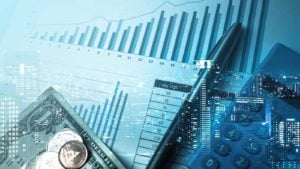
Dividend Yield: 7.81%
As we start moving higher on the yield ladder, the risk involved with each investment gets a little higher. Owl Rock Capital (NYSE:ORCC) is currently yielding 7.8%. That yield has risen significantly in 2020 due to the middle-market lender’s share price falling by 16% year to date through Jan. 23.
I wrote about Owl Rock in November, about four months after it went public in July at $15.30 a share. Although its share price has come back to its IPO price, I’m still interested in the business development company because it will pay a quarterly special dividend of 8 cents in all four quarters of fiscal 2020, adding a 2% yield to the 7.7% it’s already delivering.
In the BDCs third quarter, it reported a net income of $118.7 million, 64.2% higher than in the same period a year earlier. The average yield of the debt it holds on its middle-market borrowers is 9%.
Ares Capital (ARCC)
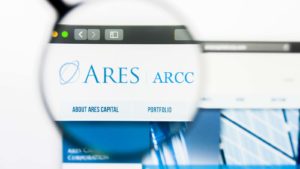
Dividend Yield: 8.49%
InvestorPlace contributor Louis Navellier likes Ares Capital (NYSE:ARCC), which is externally managed by a subsidiary of Ares Management (NYSE:ARES), a leading alternative asset manager with $144 billion in assets under management.
Navellier gives ARCC an ‘A’ rating because it makes debt and equity investments in middle-market businesses with EBITDA between $10 million and $250 million. It tends to invest primarily in first lien senior secured loans. In addition, it will make equity non-control investments of $20 million or less.
In October, Ares Capital announced its Q3 2019 results that included $212 million in net investment income, 14.5% higher than in the same quarter a year earlier. It finished the quarter with a portfolio of investments valued at $13.9 billion and net assets per share of $17.26.
The weighted average yield on its total investments is a healthy 9%. It had 352 portfolio company investments at the end of September.
As Navellier stated, ARCC won’t make you rich, but it will deliver consistent income.
Park Hotels & Resorts (PK)
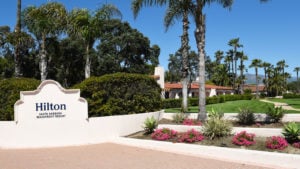
Dividend Yield: 9.63%
Park Hotels & Resorts (NYSE:PK) owns an iconic portfolio of 66 urban and resort destinations in the U.S. that are expected to generate 2019 adjusted EBITDA of at least $768 million.
The lodging REIT was spun-off by Hilton Hotels (NYSE:HLT) in January 2017. Hilton shareholders received one share of the new company for every five shares held in the parent. Since becoming a public company, PK shares have moved sideways or slightly lower over the past three years.
In September, Park completed its $2.5 billion acquisition of the Chesapeake Lodging Trust, paying $11 in cash and issuing 0.628 of a share of Park common stock for each Chesapeake share. Park shareholders ended up with 84% of the company with Chesapeake shareholders owning the rest.
The acquisition increases the quality of its hotel portfolio while upping Park’s presence in Boston, Denver, Miami, San Diego and Los Angeles.
Yielding 9.1%, Park Hotels is an excellent bet on the health of the U.S. economy.
Icahn Enterprises (IEP)

Dividend Yield: 12.4%
It’s hard to believe you can get paid 12.3% to own a portfolio of investments chosen by billionaire Carl Icahn. However, that’s exactly the case with Icahn Enterprises LP (NASDAQ:IEP), Icahn’s public investment vehicle that he took public in 2007 after merging his investment firm into American Real Estate Partners (AREP), a publicly-traded real estate holding company that he controlled.
Icahn founded AREP in 1987. Since then, it has become one of seven operating segments with approximately $23 billion in assets at the end of September. Utilizing an activist strategy that seeks out undervalued companies and then pushes for change, Icahn’s been able to build his net worth to $17.1 billion over 40 years as an investor.
Icahn Enterprises currently pays a quarterly dividend of $2. Shareholders can choose to receive the payments in cash or shares. In 2018, Icahn, who owned 91.7% of the stock, elected to receive all of his distributions in additional shares. As a result, only $95 million was paid out for cash distributions in 2018.
There are two problems with owning IEP shares.
First, the distributions paid out are taxed as regular income, so they ought to be held in tax-advantaged accounts. Secondly, the average daily volume is 108,142 or $7 million. By comparison, Berkshire Hathaway’s Class B shares have an average daily volume of 3.6 million or $826 million.
If liquidity is important to you, IEP’s not for you.
At the time of this writing Will Ashworth did not hold a position in any of the aforementioned securities.
